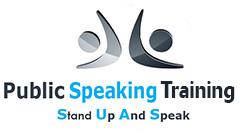- Nerves based on irrational fears – everyone feels nervous when it comes to public speaking. However, the good speakers have learnt through practice and experience how to control and mask their nerves
- Avoiding irrational thinking – for those not used to public speaking, they spend most of their time worrying about themselves, i.e. what if I faint; forget my words; come across as a bag of nerves; should I ring in sick; can I get someone else to deputise; what will my superiors think; will I miss that promotion etc. Most of this will never happen, but these are real fears for most people. Through a little bit of understanding and practicing some basic techniques, people gradually begin to move away from self-focus to speech-focus and then onto audience-focus.
- Taking on too big a task – ideally, you’ll build up your confidence gradually to fine-tune your skills and get an understanding as to what works best for you. You don’t want to find this out the hard way in front of 300 people when something goes wrong
- Thinking you can avoid public speaking – Not possible. At some stage, be it at work or socially, you will be called upon to speak in front of a group. Too many people seek help when they’ve had a terrible experience which makes the learning all the more difficult. Take the steps now to learn the basics so that when the situation arises, you’ll be prepared
- For those who have already had an unpleasant experience, the obstacles to overcome are much higher. However, a good teacher will show you had to build your confidence up slowly and how to use some simple techniques to overcome your nerves
- Thinking that you’re no good at public speaking – We need to banish this one immediately. Everyone can learn the basics of public speaking. Some will pick this up quicker than others; some will development a flair for it and push themselves into bigger, more challenging public speaking arenas. However, it’s a skill that can be learnt by everyone. In an ideal world, this skill would be taught to all teenagers in school when they are most receptive to this type of learning
- Underestimating the consequences of poor preparation or complacency – approaching every public speaking task with the same level of preparation is critical. Remember, every public performance can be videoed and you could become a social media sensation for all the wrong reasons!!
- Don’t rely on one presentation medium only, e.g. some people try and do everything via powerpoint. What happens if you’re faced with any of the following;
- asked to give an impromptu speech in work or at a function;
- or you’re asked to say a few words for a colleague who is leaving;
- or you’re called to a mngt meeting to give a brief update on a project;
- or you’ve been promoted and need to give regular updates on various issues on the floor or at their desks;
- you’re asked to read a speech at a function;
- or you’re asked to speak to the media on a particular issue
and the list goes on…
- Some people are very capable of delivering prepared speeches, but struggle when asked suddenly to comment or speak about something with no time to prepare. This can be very daunting, but there are techniques to help you cope with this. Just look at the way some of our politicians field these questions!
- Finally, you mustn’t let a fear of public speaking hold you back. You are no different to anyone else – think of it like a skill and the more you practice or experiment with it, the better you’ll get. Just don’t leave it too late to start!!
Dermot Goode is the founder of www.publicspeakingtraining.ie and the SUAS (Stand Up & Speak) public speaking programmes.
He can be contacted at This email address is being protected from spambots. You need JavaScript enabled to view it. or 086 3890560.

